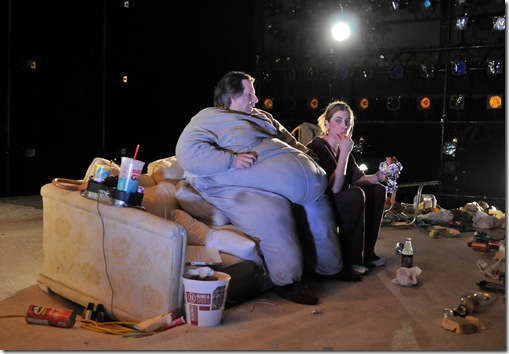A Whale of a Plot: Samuel D. Hitner’s Show at Boston’s SpeakEasy

Boston’s SpeakEasy Theatre is currently presenting the New England premiere of Samuel D. Hunter’s The Whale, winner of the prestigious 2013 Lucille Lortel Award.
The play revolves around Charlie, a solitary, secluded, cetaceous-like character, set on gorging himself to death. The reasons for his behavior remain unclear, even mysterious, until the play’s end. Charlie’s days are spent mostly sitting on a sprung sofa, enveloped in a huge sweat suit, gasping as he munches away. The slovenly stage and the space beneath are teeming with remnants of food packets.
Costume designer Gail Astrid Buckley succeeded fairly well in creating the appearance of a 600 pound man. In addition to his body, actor John Kuntz’s head, face, and hands are enlarged. Nonetheless, the effect is too theatrical to be fully believable.
Despite poor health, Charlie, a former university professor, works as an online expository writing teacher, an unrewarding job where student communications consist largely of rude and obscene remarks. Nonetheless, he puts a lot of time and effort into trying to help his students express their thoughts. Not until the end of the play does Charlie allow the students to see him. Although his one demand is that his students write an honest thought, Charlie has spent much of his life hiding from the truth.
The play has a strange, mostly expositional structure. In general, we meet characters singly as they come to meet Charlie in his apartment. While many of the scenes seem freestanding, all fit into the larger plot of the play in some way. To emphasize the structure, designer Jeff Adelberg created a lighting change following each scene.
Charlie has one friend, Liz, who takes care of him since he refuses to go to the hospital because he has no health insurance. She believes she is his confidant, but discovers that he conceals information from her. From time to time, she steps out of her nurse role and indulges him with junk food, fluffs his hair, and tries to put makeup on him. Georgia Lyman creates an energetic and complex Liz.
A third person enters the play, a nineteen-year-old Mormon, ironically named Elder Thomas, supposedly doing his mission, which in his mind is to make a difference in at least one person’s life. In fact, he is in trouble with the church and confused about the meaning of his religion.
Close to death, Charlie has a need to reconnect with Ellie, his seventeen-year-old daughter he hasn’t seen since she was two. Although gay, Charlie married her mother Mary in order to have a child. The marriage and fatherhood ended when Charlie fell in love with Alan, one of his male university students. Throughout the years Charlie has been secretly saving whatever money he can in order to leave Ellie an inheritance. Whether it is out of a sense of guilt, a need for forgiveness, a token of the love he had for the baby he left or all three, is unclear.
Josephine Ellwood’s Ellie is a believable angry adolescent ready to hurt and/or bring down others. She mocks her classmates on her website. She flirts with the naïve Elder Thomas, gets him high, and reports him to his church. Her feelings towards her parents seem to be resentment and a desire to humiliate them. Desperate, Charlie offers to help Ellie who is flunking out of school by writing her essays. He tells her about her $100,000 inheritance to win her kindness. Her response is ungratifying.
Mary, Charlie’s ex-wife is the last of his visitors. Although her bitterness towards Charlie has lessened over the years, she finds their daughter cruel and incorrigible. Conceivably, Mary is wrong given that Ellie tries to call an ambulance when Charlie has a heart attack. Had Charlie been taken to the hospital, Ellie would have lost her inheritance.
The final revelation in this overly complex and underwritten play describes the demise of Charlie’s lover, another guilt ridden Mormon and the older brother of Liz who had found his emaciated body. Demeaned at a church service presided over by his father, evidently for his homosexuality, the shamed Alan starved himself to death. Having Charlie choose the opposite form of suicide makes The Whale a little too neat.
The production is very well acted by all. John Kuntz stands out in a role that makes unusual physical and emotional demands. David R. Gammon’s direction is workmanlike.
Playing from March 4 through April 4, 2014
Directed by David R. Gammons
Scenic Design by Cristina Todesco
Costume Design by Gail Astrid Buckley
Lighting Design by Jeff Adelberg
Sound Design by David Remedios
Cast
Charlie John Kuntz
Elder Thomas Ryan O’Connor
Liz Georgia Lyman
Ellie Josephine Elwood
Mary Maureen Keiller